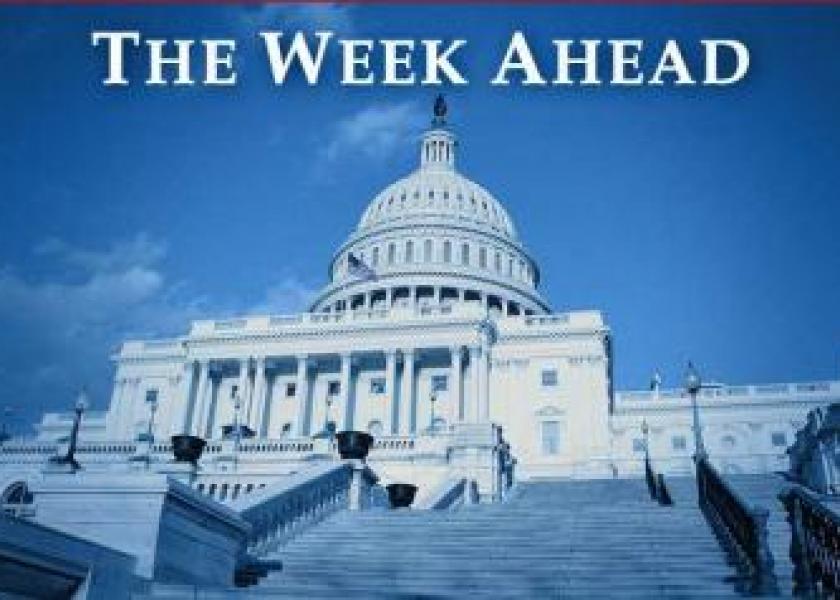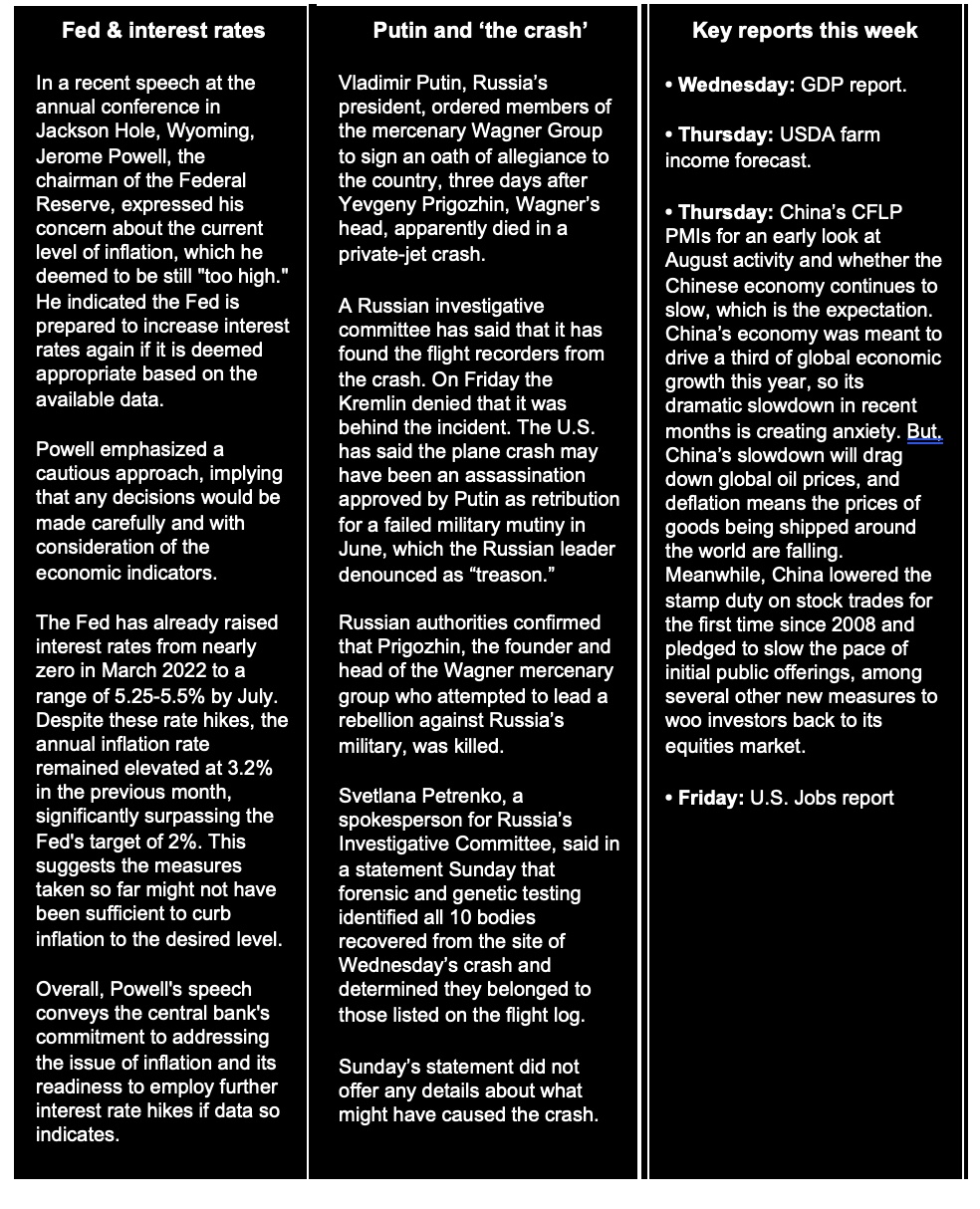U.S., China Economic Reports This Week Will be Closely Followed

Raimondo in China | Russia confirms Prigozhin killed | More restrictions on India rice shipments

Washington Focus
Lawmakers continue their long summer recess, but staffers continue to work on drafting a new farm bill. As Sen. John Boozman (R-Ark.) told us last week, funding is still an issue and work is still not completed on trying to improve farm safety net provisions in Title 1.
Federal Reserve Chair Jerome Powell's recent speech at the annual symposium in Jackson Hole, Wyoming, highlighted his stance on interest rates and the economy. Powell argued for maintaining steady interest rates for now but indicated the possibility of raising them later in the year if the economy does not slow enough to control inflation. He emphasized the delicate balance he seeks to strike between curbing inflation without causing unnecessary economic slowdown.
“We are prepared to raise rates further if appropriate, and intend to hold policy at a restrictive level until we are confident that inflation is moving sustainably down toward our objective,” Powell said. After stripping out food and fuel for a look at the underlying trend, the central bank’s preferred inflation gauge is still running at about twice the Fed’s goal. “The process still has a long way to go, even with the more favorable recent readings,” Powell said. “We can’t yet know the extent to which these lower readings will continue or where underlying inflation will settle over coming quarters.”
Powell's speech included the phrase "proceed carefully" multiple times, indicating a cautious approach to any future decisions. He suggested that there's no urgency to raise rates at the next policy meeting in September.
He acknowledged signs that the economy might not be slowing as expected, potentially jeopardizing progress in reducing inflation. If the economy grows above its usual rate, Powell indicated a willingness to tighten monetary policy further. Powell noted house prices and rent prices are still going up, even after 11 rate hikes. Indeed, he worried that even now, "the housing sector is showing signs of picking back up." Of note: U.S. mortgage debt now totals $12 trillion, or 45% of GDP.
The FOMC policy meetings are scheduled for Sept. 19-20, Oct. 31-Nov. 1, and Dec. 12-13.
Powell's speech also acknowledged concerns about further rate hikes weakening the economy and potential slower inflation decline. He noted that financial conditions had tightened, impacting lending standards and borrowing rates.
Powell emphasized the Fed's commitment to its 2% inflation target.
He highlighted the uncertainty around determining the right level of interest rates to achieve economic restraint.
Following the speech, traders put higher odds that the Federal Open Market Committee will raise interest rates at one of its next two meetings. Odds the headline interest rate is a quarter-point higher than current levels after the November meeting ticked up to 48.3% from 42.2% on Thursday, according to CME FedWatch Tool (link).
India, the world's leading exporter of rice, has introduced additional restrictions on rice shipments, which are likely to further impact global supplies of this essential food staple. The Indian government announced implementation of a floor price of $1,200 per ton for basmati rice exports. This move aims to prevent traders from attempting to export non-basmati white rice, which has been banned for exports, by disguising it as the more expensive aromatic basmati variety. This follows imposition of a 20% export tax on parboiled rice, confirming previous reports. India's actions are part of its strategy to manage local food prices, particularly ahead of an upcoming general election, where Prime Minister Narendra Modi seeks re-election. The government has also indicated that exporters with valid letters of credit before the introduction of the new parboiled rice rule will still be permitted to export this variety. The export tax on parboiled rice will be effective until Oct. 15.
Impact: Domestic prices of parboiled rice are expected to decrease, aiding the government in controlling food inflation. However, on a global scale, rice prices are projected to rise, leading to renegotiations between buyers and sellers regarding existing contracts. This situation could impact countries heavily reliant on rice imports, such as the Philippines and certain African nations.
Of note: Parboiled rice, which undergoes a partial boiling process before milling to enhance its nutritional value and alter its texture when cooked, constitutes a significant portion of India's total rice exports.
Besides the recent bans and restrictions on rice varieties, India has also limited wheat and sugar shipments, imposed constraints on crop stockpiling, and is considering abolishing a 40% import duty on wheat. Additionally, India is exploring options such as selling products from state reserves, such as tomatoes, onions, and grains, to enhance local supplies.
UAW members vote to authorize potential strike. Workers at Detroit's major automakers voted overwhelmingly in favor of granting the United Auto Workers (UAW) leadership the authority to call for a strike, as negotiations between the union and the companies continue. Some 97% voted in favor of strike authorization.
Of note: The strike-authorization vote is a procedural step that gives the union leadership the ability to initiate a work stoppage if deemed necessary. However, it does not guarantee that an actual strike will occur.
What’s up: The UAW is currently negotiating new four-year labor agreements for around 146,000 hourly workers at General Motors, Ford Motor, and Stellantis. The existing contracts are set to expire on Sept. 14.
Demand: The union's demands include regaining benefits lost in previous negotiations and securing a substantial wage increase, potentially up to 40% over the contract's duration.
Gina Raimondo, the Secretary of Commerce, traveled to China on Saturday with the dual responsibilities of strengthening U.S. business relations with Beijing and imposing some of the toughest Chinese trade restrictions in years. The Commerce Department has implemented extensive trade restrictions on sales of chips, software, and machinery to China's semiconductor industry. More restrictions are being considered. It is a four-day visit to Beijing and Shanghai to meet senior Chinese officials and U.S. business leaders during the first part of this week.
“Look, this is just the reality: The U.S. and China share a large, dynamic, growing economic relationship, one of the largest trade relationships in the world, and both of our countries, in fact, the entire world, need us to manage that relationship responsibly,” Raimondo told reporters Friday before her trip. The visit is the first by a U.S. commerce secretary in seven years
Her visit follows other administration officials like John Kerry, Treasury Secretary Janet Yellen, and Secretary of State Antony J. Blinken who have traveled to China.
American businesses hope for increased intellectual property protections and access to the Chinese market, but China's sputtering economy, lockdowns, and technology restrictions complicate matters. The Biden administration acknowledges China's threat to national security while recognizing its economic importance.
On Tuesday, President Joe Biden hosts his Costa Rican counterpart Rodrigo Chaves for a bilateral meeting at the White House
Economic Reports for the Week
New data on the U.S. labor market (Friday) will be this week's highlight, as well as earnings reports from several retailers and the latest inflation data.
Monday, Aug. 28
- Dallas Fed Manufacturing Survey. The activity index is expected to post a 16th straight negative score, at a steep minus 21.0 in August versus minus 20.0 in July.
- Earnings include Nordic American Tankers and Baozun .
Tuesday, Aug. 29
- Case-Shiller Home Price Index. Forecasters see the adjusted 20-city monthly rate rising 1.1% in June versus May's 1.0% increase. The unadjusted index is expected to rise 0.8% on the month but still fall 1.1% on the year, the latter would compare with 1.7% contraction in May. Case-Shiller prices have exceeded expectations the last four months in a row.
- JOLTS: Bureau of Labor Statistics (BLS) will publish the results of the July Job Openings and Labor Turnover Survey (JOLTS). June's 9.582 million was near expectations and though down from 9.616 million in the prior month, still pointed once again to strong demand for labor. The consensus for July is 9.559 million.
- Conference Board's Consumer Confidence Survey for August. The index is expected to hold roughly steady in August, at a consensus 116.5 versus July's 117.0. This report has exceeded not only the consensus in the last three reports but the consensus range as well.
- Earnings include Best Buy, J. M. Smucker, PDD Holdings, Bank of Montreal, HP, NIO, and Bank of Nova Scotia.
Wednesday, Aug. 30
- MBA Mortgage Applications
- ADP Employment Report. Forecaster see ADP's August employment number at 200,000. This would compare with July growth in private payrolls reported by the Bureau of Labor Statistics of 172,000. ADP's number for July was high for a second month in a row at 324,000.
- GDP. The second estimate of second-quarter GDP is expected to show no change from 2.4% growth in the quarter's first estimate. Personal consumption expenditures, at 1.6% growth in the first estimate, is expected to come in at 1.7% in the second estimate.
- International Trade in Goods [Advance]. The U.S. goods deficit (Census basis) is expected to widen by $2.0 billion to $90.8 billion in July after narrowing by $2.8 billion in June to $88.8 billion.
- Pending home sales in July, which in June rose 0.3%, are expected to fall 0.4%.
- Earnings include Salesforce, CrowdStrike, Brown-Forman, and Five Below.
Thursday, Aug. 31
- Jobless claims for the August 31 week are expected to come in at 238,000 versus 230,000 in the prior week.
- Personal income is expected to rise 0.3% in July with consumption expenditures expected to increase a solid 0.6%. These would compare with June's 0.3% increase for income and 0.5% increase for consumption. Inflation readings for July are expected at monthly increases of 0.2% both overall and for the core (versus June's increases of 0.2%t for both). Annual rates are expected at 3.3% overall and 4.2% for the core (versus June's 3.0% and 4.1%).
- The Chicago PMI is expected to rise in August to 44.6 versus 42.8 in July which was the eleventh straight month of sub-50 contraction.
- Fed Balance Sheet
- Money Supply
- Federal Reserve: Raphael Bostic speaks.
- Earnings include Campbell Soup, Broadcom UBS Group, VMware, Dell Technologies, and Lululemon.
Friday, Sept. 1
- Employment. A moderating but still solid 170,000 rise is the call for nonfarm payroll growth in August versus 187,000 in July which was a bit lower than expected. Average hourly earnings in August are expected to rise 0.3% on the month for a year-over-year rate of 4.4%; these would compare with 0.4% and 4.4% in the prior two reports. August's unemployment rate is expected to hold unchanged at 3.5%.
- Motor vehicle sales. Unit vehicle sales in August are expected to edge higher to a 15.6 million annual rate from 15.7 million in the prior two months.
- The final manufacturing PMI for August is expected to come in at 47.0, unchanged from the mid-month flash to indicate sizable contraction in activity.
- The ISM manufacturing index has been in contraction the last nine months. August's consensus is 46.8 versus July's 46.4.
- Construction spending for July is expected to rise 0.5% to match June's 0.5% increase that benefited from a second strong month for residential spending.
- Federal Reserve: Raphael Bostic speaks.
Key USDA & international Ag & Energy Reports and Events
Key updates this week include StatsCanada production data for wheat, barley and canola (Tuesday) and a USDA farm income forecast update (Thursday).
Monday, Aug. 28
Ag reports and events:
- Export Inspections
- Crop Progress
- Livestock and Meat Domestic Data
- Peanut Stocks and Processing
- Holiday: U.K.
Energy reports and events:
- Earnings: Sinopec
Tuesday, Aug. 29
Ag reports and events:
- Agricultural Exchange Rate Data Set
- StatsCanada production data for wheat, barley and canola
- EU weekly grain, oilseed import and export data
Energy reports and events:
- API weekly U.S. oil inventory report
- Earnings: Motor Oil
Wednesday, Aug. 30
Ag reports and events:
- Broiler Hatchery
- Egg Products
- U.S. and Canadian Cattle
- U.S. and Canadian Hogs
Energy reports and events:
- EIA weekly U.S. oil inventory report
- U.S. weekly ethanol inventories
- Genscape weekly crude inventory report for Europe’s ARA region
- Earnings: PetroChina
- Holiday: Kazakhstan
Thursday, Aug. 31
Ag reports and events:
- Weekly Export Sales
- Highlights From the August 2023 Farm Income Forecast
- Fluid beverage milk sales by product (Annual)
- Number and average size of U.S. fluid milk product plants
- Outlook for U.S. Agricultural Trade
- Selected soft dairy products, domestic use (Annual)
- Vegetable and Pulses Yearbook
- Agricultural Prices
- Citrus Fruits
- Port of Rouen data on French grain exports
- Holiday: Malaysia
Energy reports and events:
- EIA natural gas storage change
- Insights Global weekly oil product inventories in Europe’s ARA region
- Brent October futures expire
- Earnings: Gulf Keystone Petroleum
Friday, Sept. 1
Ag reports and events:
- CFTC Commitments of Traders report
- Peanut Prices
- Cotton System Consumption and Stocks
- Fats & Oils: Oilseed Crushings, Production, Consumption and Stocks
- Grain Crushings and Co-Products Production
- Malaysia’s palm oil exports in August
- FranceAgriMer’s weekly crop condition report
- Holiday: Vietnam
Energy reports and events:
- Baker Hughes weekly U.S. oil/gas rig counts
|
KEY LINKS |
WASDE | Crop Production | USDA weekly reports | Crop Progress | Food prices | Farm income | Export Sales weekly | ERP dashboard | California phase-out of gas-powered vehicles | RFS | IRA: Biofuels | IRA: Ag | Student loan forgiveness | Russia/Ukraine war, lessons learned | Russia/Ukraine war timeline | Election predictions: Split-ticket | Congress to-do list | SCOTUS on WOTUS | SCOTUS on Prop 12 pork | New farm bill primer | China outlook | Omnibus spending package | Gov’t payments to farmers by program | Farmer working capital | USDA ag outlook forum | Debt-limit/budget package |






